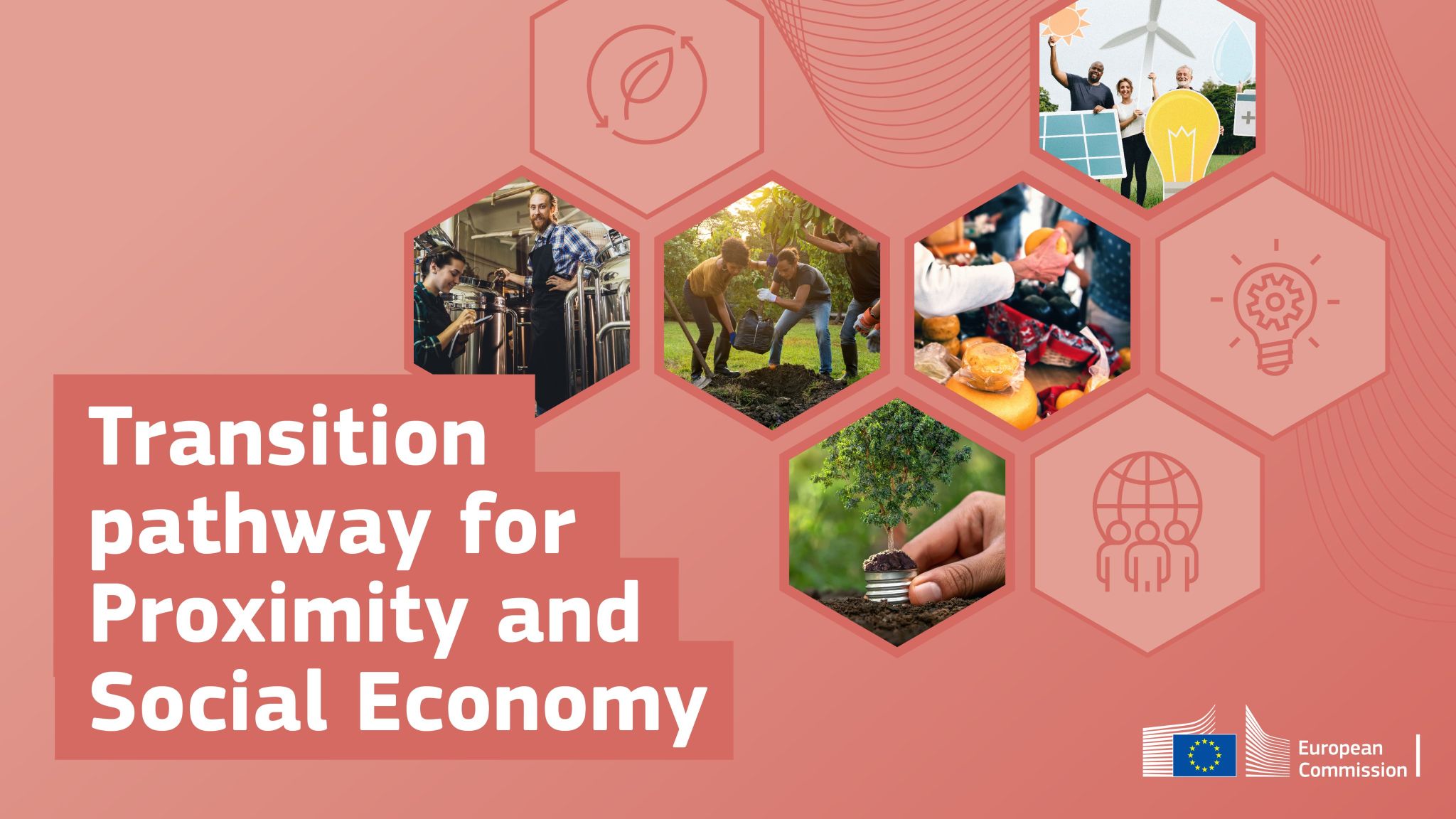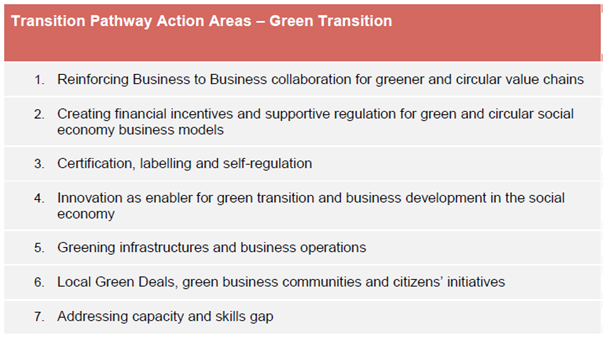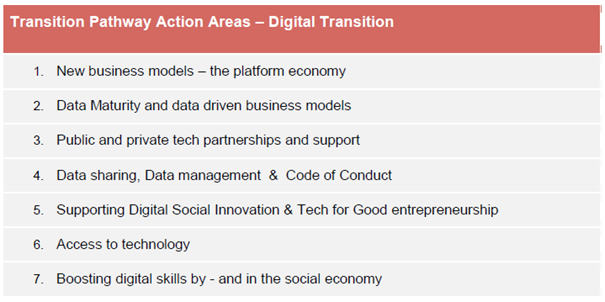
On November 14, the European Commission presented the Transition Pathway for Proximity and Social Economy, which outlines measures for green and digital transition in social economy enterprises, including cooperatives. The proximity & social economy ecosystem is one of the 14 industrial ecosystems identified by the European Commission in the 2021 Industrial Strategy update, and one of the first ecosystems for which the European Commission has developed such a pathway. The work on transition pathways is carried out by the Commission in collaboration with public and private stakeholders; CECOP has actively participated in a number of workshops and has submitted written evidence, as well as took part in the consultative board of the consortium subcontracted by the Commission who led the drafting process.
The document acknowledges that social economy enterprises, including cooperatives, also constitute parts of other industrial ecosystems such as the ones on tourism, mobility and construction, sectors where CECOP has an important amount of affiliated cooperatives. However, it discusses challenges and advantages specific to social economy.
According to the European Commission’s data, social economy is the “centre of gravity” of the proximity & social economy industrial ecosystem – it provides jobs 13.6 million people, representing 6,3% of the EU workforce. In some member states, it contributes up to 10% of the national GDP. The document recognizes the unique advantages of social economy enterprises, including cooperatives, in promoting green and digital transition:
- A number of these enterprises already contribute to the green and digital transition in their daily operations. The document specifically mentions railway and taxi cooperatives, other cooperative shared mobility services, energy cooperatives, industrial cooperatives active in the production and recycling of solar panels, and platform cooperatives
- The Transition Pathway highlights the contribution of platform cooperatives to “a positive impact on working conditions, a fairer distribution of incomes, practice union rights, mutualise costs and enable equitable distributions of incomes” as well as to innovation, tariffs and fees. Notably, it quotes the CoopCycle federation – part of CECOP’s network – as a good practice of digital technology use those favours platform workers
- It also mentions data cooperatives as a best practice (already mentioned previously in the Data Governance Act)
- The core values of social economy are inclusiveness and solidarity. “Their participatory business models, that take into account the needs of citizens, employees and other stakeholders, help to ensure that the transitions are fair and inclusive”
- Social economy enterprises contribute to development of local territories and human development, and empower grassroots, people-driven growth
- Social economy is resilient
- Worker buy-outs have specifically been mentioned as offering continuation opportunities for businesses
At the same time, social economy ecosystem faces a number of challenges and needs on the path towards green and digital transition:
- Enabling environment for social economy must be created / reinforced
- This concerns, in particular, development of support structures; improved access to investment and public funding, which is often particularly hard to obtain for social economy entities; national recognition and appropriate legal frameworks for social economy business models; improved liaison with local and regional authorities; and promotion of social public procurement
- While some social economy entities have significantly increased the extent of their operations during the COVID-19 pandemic, overall, this ecosystem has been one of the worst hit by the crisis. Right now, in the context of the war in Ukraine, social economy both has to struggle to mitigate the economic fallout, and to assist the victims of the conflict
- Competition from large mainstream businesses such as platforms
- The need to address the significant investment gap in social infrastructure (health and education facilities, housing)
- The skills deficit
- The need to raise capacity of social economy associations and federations
The Transition pathway has identified 14 key action areas on the way to green and digital transition in the ecosystem.


The implementation of the transition pathway will mainly rely on the actions of stakeholders, including Member States, regions, social economy entities, their associations and federations. It will receive limited support from the European Commission, which will gather stakeholders’ pledges and monitor progress. Therefore, the Transition Pathway does not contain an ambitious plan for action on the side of the European Commission. Nonetheless, some important actions are foreseen, including:
- Advisory services via the Enterprise Europe Network, including exchange opportunities through its sectoral working group on Social Economy, and the European Resource Efficiency Knowledge Centre
- Networking and support via the European Digital Innovation Hubs and other tech advisory services
- Support to the development of platform cooperatives and data cooperatives
- Fiscal incentives or technical support for greening social economy’s operations
- Support to social finance initiatives
CECOP welcomes the publication of the Transition Pathway and the positive recognition accorded to cooperatives. We look forward to ambitious actions in support of the pathway by the European Commission, EU Member States, regional and local authorities. While cooperatives already make important contributions to inclusive and fair green and digital transition, many of them face unique legal and financing challenges compared to large traditional enterprises. Increased support by the authorities is a must.
The call for stakeholders’ pledges is available here.
Read the Transition Pathway for Proximity and Social Economy here.
Pictures: European Commission







 Sustainable Growth
Sustainable Growth 

